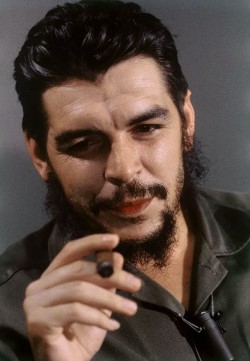
As we approach the 50th anniversary of the death of a 20th-century revolutionary madman Ernesto "Che" Guevara who was killed on October 9, 1967, in Bolivia we ask was Che a monster or a guerilla legend?
Ernesto Guevara was born on June 14, 1928 to a well to do family. He went on become an Argentine Marxist r, a physician, an author, and most of all a guerrilla leader.
Che was a major figure of the Cuban Revolution and has become a countercultural symbol of rebellion and in popular culture. As a young medical student, Che traveled throughout The Americas and was radicalized by the poverty, hunger, and disease he witnessed. His desire to help overturn what he saw as the capitalist exploitation of Latin America by the United States prompted his involvement in Guatemala's social reforms under President Jacobo Árbenz, whose eventual CIA-assisted overthrow at the behest of the United Fruit Company solidified Guevara's political ideology. Later in Mexico City, Guevara met Raúl and Fidel Castro, where he joined their 26th of July Movement and sailed to Cuba aboard the yacht Granma with the intention of overthrowing U.S.-backed Cuban dictator Fulgencio Batista. Guevara soon rose to prominence among the insurgents, was promoted to second-in-command and played a pivotal role in the victorious two-year guerrilla campaign that deposed the Batista regime.
Following the Cuban Revolution, Guevara began reviewing the appeals and leading firing squads for those convicted as war criminals during the revolutionary tribunals. He started instituting agrarian land reform as minister of industries, helping spearhead a successful nationwide literacy campaign, serving as both national bank president and instructional director for Cuba's armed forces as well as traveling as a diplomat on behalf of Cuban socialism. Such positions also allowed him to play a central role in training the militia forces who repelled the Bay of Pigs Invasion and bringing the Soviet nuclear-armed ballistic missiles to Cuba which precipitated the 1962 Cuban Missile Crisis.
Che was a real pig and was no friend of hygiene. He was also a devoted writer composing a seminal manual on guerrilla warfare, along with his youthful continental motorcycle journey. His experiences and studying of Marxism–Leninism led him to feel that the Third World's underdevelopment and dependence was an intrinsic result of imperialism, neocolonialism and monopoly capitalism, with the only remedy being proletarian internationalism and world revolution.
Guevara left Cuba in 1965 to foment revolution abroad, first unsuccessfully in Congo-Kinshasa and later in Bolivia, where he was captured by CIA-assisted Bolivian forces and executed.
‘It’s over’: How I captured Che Guevara https://www.ft.com/content/63632118-a891-11e7-ab55-27219df83c97
Irish Postal Stamp to Honor Che on 50th Anniversary of Death http://bit.ly/2y5vA7Y
Che Guevara's legacy still contentious 50 years after his death in Bolivia https://www.theguardian.com/world/2017/oct/05/che-guevara-legacy-50-yea…
1964 Che Guevara Interview With ABC Reporter, Lisa Howard! https://youtu.be/G9DyXX7YKuk
Che habla de camilo https://youtu.be/25A6AfUYwtA
The True Story of Che Guevara https://youtu.be/XkUg-SHbIDA
1964 THROWBACK: CHE GUEVARA On "FACE THE NATION" https://youtu.be/CPCuzfDeUpc
Che Guevara in New York, USA 1964 - interview https://youtu.be/qRuH_8W1bwY